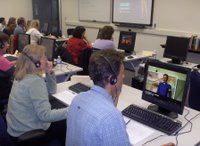Educational Technology and Life
Context-embedded, Inquiry-driven, and Collaborative Learning
Educational Technology and Life has moved:
Tuesday, December 13, 2005
Educators Play Food Force!
 After an hour of theory, including the work of Prensky, Gee, Aldrich, and others, teachers are finally getting to go hands on with Food Force! They will be asked to reflect on their experience as players, on how well the game reflects the theories we discussed, and on how well the gameplay reflects the content and learning objectives of the game. (I know Clark Aldrich suggested I not have them critique the game, since they are not in the position of developing games, but this should make for interesting discussion.. and should aid them in critically assessing the educational value of a game.)
After an hour of theory, including the work of Prensky, Gee, Aldrich, and others, teachers are finally getting to go hands on with Food Force! They will be asked to reflect on their experience as players, on how well the game reflects the theories we discussed, and on how well the gameplay reflects the content and learning objectives of the game. (I know Clark Aldrich suggested I not have them critique the game, since they are not in the position of developing games, but this should make for interesting discussion.. and should aid them in critically assessing the educational value of a game.) I hope to record and post some of their reflections this evening, too.
3 Comments:
Hi Mark,
Evaluating educational simulations is going to be a new, learned and developed skill.
My experience so far is that when educators are put in front of educational simulations to “evaluate” them, they compare it to what they believe to be a “perfect” traditional educational experience. As I wrote in Learning by Doing, it is a bit like asking George Lucas to evaluate Pac-Man in 1979.
Having said that, I do believe exposure is key, and I both think what you are doing is fantastic, and what the teachers are doing in playing Food Force is wonderful.
To cynically make the point, I would like to try this experience. Break teachers into two groups. One group “evaluates” some piece of educational simulation software. The other group “evaluates” some unfamiliar but best selling computer game. I believe the “criticisms” of the two would be surprisingly similar.
More fairly, I suggest the only way of “evaluating” educational simulations is by having students go through them. A few teachers facilitate the experience (anyone who believes educational simulations do not need great teachers is absolutely wrong). Then measure the results. Thus setting up a great evaluation is a more productive activity than a casual gut-check.
As always, great work!
Clark
Karen, thanks again for your comments. It was great to finally be sharing this with other educators... and with a fellow student of the topic as well. :)
Also, thank you for the thoughtful Christmas gift you brought with you, too.
I hope you're having a great holiday season!
-Mark
Thank you for your comments and continued support. Thankfully, my experience was a bit different from what you describe. Several of the participants were... I would say "moved" by the experience... and made observations that were new to me. For instance, one shared that Food Force taught them how much work and cost goes into feeding the hungry that is not directly related to food, and how much better the game was at illustrating that than any commercial could be. Two had never played video games before and were suddenly able to identify with the way students are hyper-focused on the game. Another noticed that I, as the instructor, had gone from doing all the work at the front of the room, to watching them from the back of the room as they worked on their computers. 'Good stuff on the whole. (The audio I captured on the fly didn't turn out so great, but I may be able to get some of their reflections online when I get a moment to edit it.) Incidentally, they were happy to hear your perspective on simulations and the need for teachers, which I shared during the class. :)
Since I have access to educators, I'll have to try our experiment sometime. I think Prensky would come to the same conclusion as you, though perhaps for different reasons... based on his comments at the Serious Games Summit in DC, he might suggest the commercial game was just as effective (or more so) as a learning environment.
Thanks again for your contribution to the conversation here.
Post a Comment
<< Home